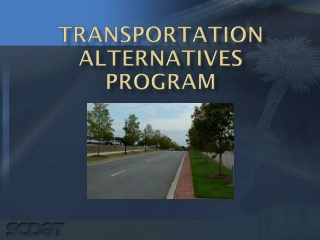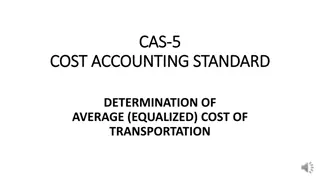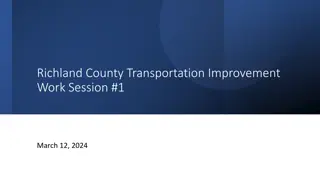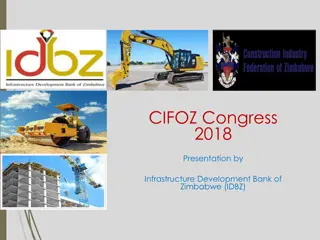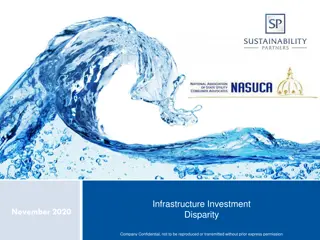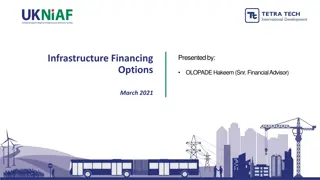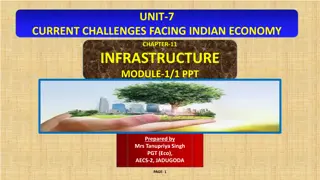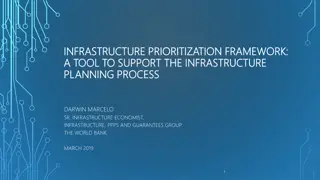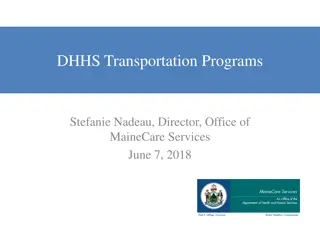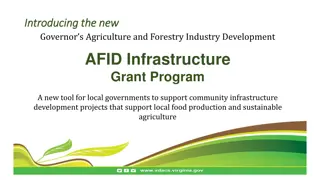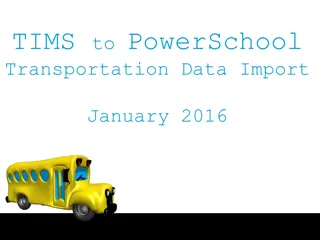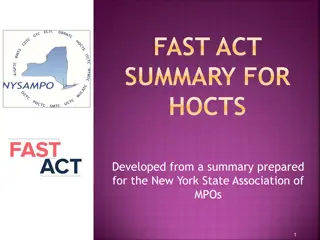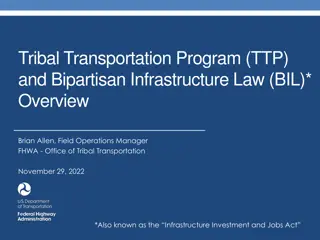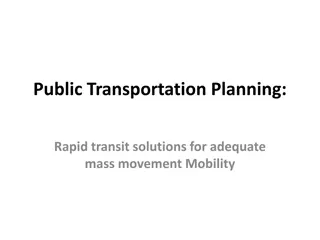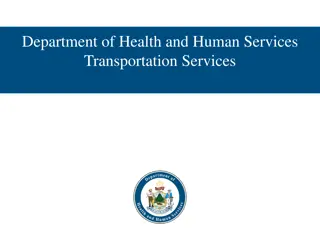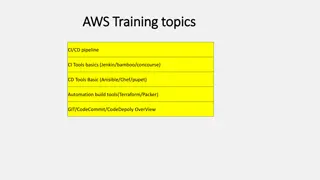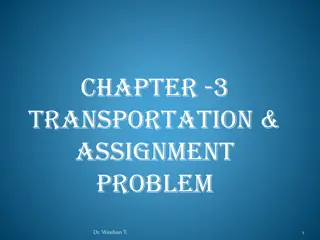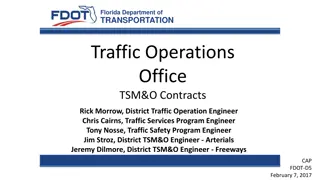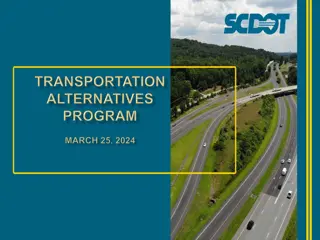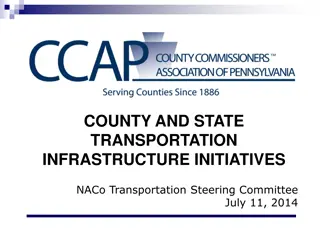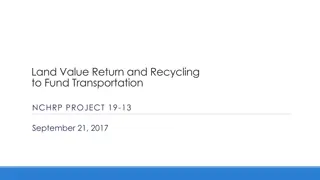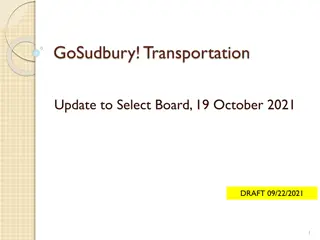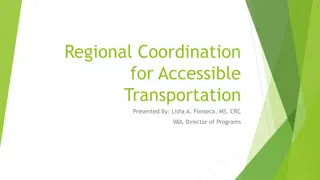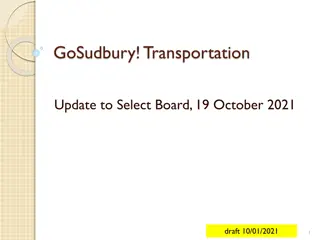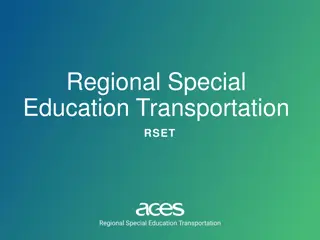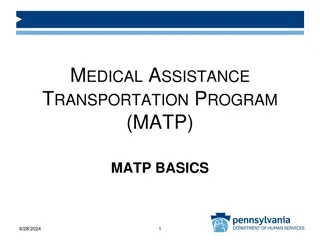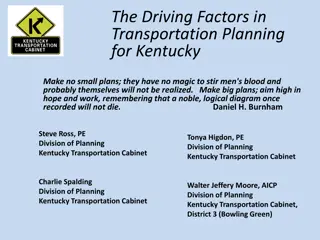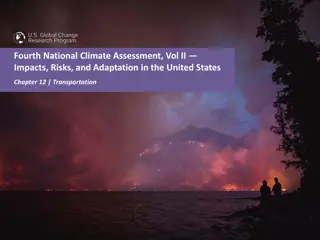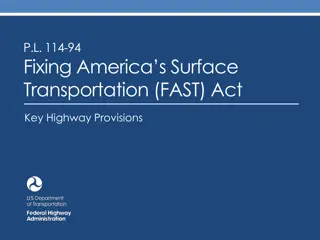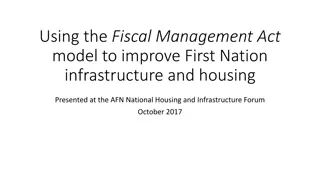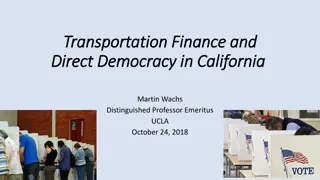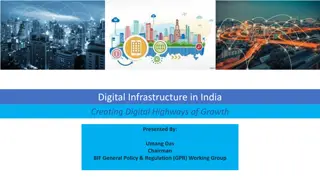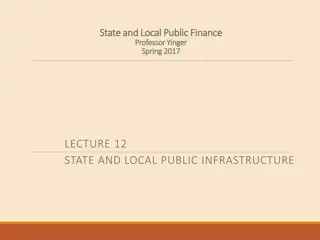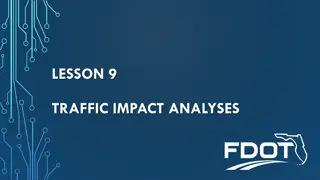Funding Opportunities for Non-Motorized Transportation in South Carolina
The US Department of Transportation's Federal Highway Administration provides funding to South Carolina through the Transportation Alternatives Program (TAP) to support non-motorized transportation initiatives. Local governments, schools, and other entities can partner with the South Carolina Depart
1 views • 21 slides
Challenges and Progress in Chilean Infrastructure Development
The challenges of Public-Private Partnerships (PPPs) in Chile within the framework of best practices and international standards are discussed, highlighting the need for long-term infrastructure planning and enhanced governance. The 2017 OECD Infrastructure Governance Review identified deficiencies
4 views • 40 slides
Advanced Research Projects Agency Infrastructure (ARPA-I) Overview
ARPA-I, a branch of the U.S. Department of Transportation, focuses on developing innovative infrastructure technologies for transportation, aiming to achieve net-zero emissions and enhance safety, efficiency, and resilience. Topics of interest include materials, digital infrastructure, automated veh
0 views • 21 slides
Infrastructure Programme Implementation Plan (IPIP) - Module 7 Overview
Module 7 of the Infrastructure Delivery Management System (IDMS) focuses on the Infrastructure Programme Implementation Plan (IPIP). It provides guidance to programme managers on applying management principles for effective planning and management of infrastructure projects. The module emphasizes sy
3 views • 33 slides
Cost Accounting Standards for Determining Transportation Costs
Understanding the importance of transportation costs in procurement and distribution, this guide outlines the standards for determining average costs, separation of transportation costs in accounting records, objectives for maintaining cost uniformity, components of transportation costs, and treatme
0 views • 11 slides
Oklahoma Transportation GIS Cabinet Overview
Oklahoma's Transportation Cabinet consists of three agencies responsible for managing federal aid highways, county roadway data aggregation, Turnpike infrastructure, and aeronautics. The GIS infrastructure includes 18 full-time staff primarily using Esri Enterprise GIS tools for data integration and
1 views • 10 slides
Understanding Transportation Programs and Trends
Transportation training session led by Megan Johnson, featuring topics such as Transportation Crash Course, Training Opportunities, and Transportation Trends & Updates. Includes discussions on different types of transportation services and their importance for communities.
2 views • 38 slides
Richland County Transportation Improvement Summary
Richland County's transportation improvement work includes sessions on project principles, funding options, project costs, and guidelines for utilizing the transportation penny. The focus is on addressing transportation needs, project prioritization, funding challenges, and division of funds for var
0 views • 19 slides
Infrastructure Development Bank of Zimbabwe (IDBZ) - Financing Zimbabwe's Infrastructure Needs
The presentation by the Infrastructure Development Bank of Zimbabwe (IDBZ) at the CIFOZ Congress 2018 outlines the critical infrastructure sectors, funding requirements, and the funding gap faced by Zimbabwe. IDBZ is mandated to facilitate infrastructure development in key sectors like ICT, housing,
4 views • 20 slides
Addressing Infrastructure Investment Disparity: Challenges and Solutions
The disparities in infrastructure investment pose significant challenges, with the nation facing an aging infrastructure that requires substantial funding for maintenance and upgrades. Despite the positive economic impacts of infrastructure investments, many communities struggle to access the necess
0 views • 12 slides
Understanding Infrastructure Financing Options and Principles
This presentation discusses the various tools and principles of infrastructure financing, including project finance, corporate finance, public finance, and blended finance. It covers the differences between financing and funding in infrastructure provision, the challenges faced by infrastructure ser
0 views • 32 slides
Challenges and Importance of Infrastructure in Indian Economy
Infrastructure is crucial for economic growth in India, encompassing services like transport, power, communication, and more. The differing roles of social and economic infrastructure are outlined, highlighting their impact on human and economic resources. The significance of infrastructure lies in
0 views • 16 slides
Infrastructure Prioritization Framework and Challenges
The Infrastructure Prioritization Framework (IPF) is a tool designed to support the infrastructure planning process, aiming to address challenges such as infrastructure gaps, limited resources, and technical capacity constraints. The tool integrates social, environmental, and financial criteria to h
1 views • 25 slides
Maine DHHS Transportation Programs Overview
The Maine Department of Health and Human Services (DHHS) oversees various transportation programs aimed at providing non-emergency transportation services to low-income, child welfare-eligible, and Section 17-eligible individuals. These programs are managed through regional brokerage systems, with b
3 views • 5 slides
Introducing the New Governor's AFID Infrastructure Grant Program
The Governor's Agriculture and Forestry Industry Development (AFID) Infrastructure Grant Program is a new initiative to support community infrastructure projects that promote local food production and sustainable agriculture. Through this program, local governments can access funding to enhance thei
0 views • 24 slides
Importing TIMS Transportation Data into PowerSchool
Explore the process of extracting, formatting, purging, and importing TIMS transportation data into PowerSchool for efficient management of student transportation information. This includes creating TIMS extracts, updating bus stop information, and optimizing transportation planning through geocodin
2 views • 43 slides
Overview of FAST Act for Transportation Planning
The FAST Act, passed in 2015, authorizes federal programs for transportation development with a focus on surface transportation. It extends funding through 2020, totaling $304.7 billion. The Act aims to enhance resiliency, reliability, and stormwater mitigation in transportation systems. Planning fa
2 views • 10 slides
Tribal Transportation Program & Bipartisan Infrastructure Law Overview
The Tribal Transportation Program (TTP) and Bipartisan Infrastructure Law (BIL) provide funding for essential transportation projects in Tribal communities. The TTP Bridge Fund, Safety Fund, and High Priority Projects aim to improve infrastructure and safety. The BIL funding for FY22-FY26 totals $3.
1 views • 13 slides
Efficient Public Transportation Planning for Mass Mobility
Rapid transit solutions like high-capacity public transportation systems, including overground rail, underground rail, trams, and BRT systems, play a crucial role in enhancing mass movement efficiency. Factors such as journey time, transport costs, vehicle operating costs, and the benefits of rapid
1 views • 20 slides
DHHS Coordination of Transportation Service Contracts Overview
The Department of Health and Human Services in Maine conducted an assessment of Transportation Services in June 2019. The workgroup identified three main priorities: alignment of Quality and Performance Measures, Safety Measures, and Evaluation of Transportation Services. The first priority involves
0 views • 28 slides
Introduction to Terraform for Infrastructure Automation
Terraform is a powerful tool used for building, changing, and versioning infrastructure efficiently and safely. It operates based on Infrastructure as Code principles, allowing for versioning of infrastructure configurations like any other code. With features like Execution Plans, Resource Graph, an
0 views • 27 slides
President Trump's $1.5 Trillion Infrastructure Plan: Key Points for Counties
President Trump introduced a $1.5 trillion federal infrastructure package with a focus on regulatory reform, aiming to stimulate new investment, shorten project approval times, and address rural infrastructure needs. The plan includes $200 billion in new federal spending, leveraging funds for projec
0 views • 21 slides
Understanding Transportation and Assignment Problem
Transportation and assignment problems involve optimizing the shipment of goods from various sources to multiple destinations while minimizing total transportation costs. These problems deal with limited supply, known demand, constant shipping costs, and integer quantities. The transportation algori
0 views • 64 slides
Florida Department of Transportation Projects Overview
The Florida Department of Transportation is actively engaged in various transportation projects including Traffic Operations, Planning & Environmental Management, TSM&O contracts, Integrated Corridor Management, and Connected Vehicle Pilots. The projects involve a range of activities such as freeway
0 views • 8 slides
Enhancing Transportation Infrastructure Through Federal Funding Programs
The Transportation Alternatives Program (TAP) funded by the USDOT's Federal Highway Administration supports transportation projects in South Carolina based on population categories. TAP funds are allocated to Transportation Management Areas (TMAs), Small Urban Areas, and Non-Urban Areas, prioritizin
0 views • 21 slides
Transportation Infrastructure Initiatives in Dauphin County
The County and State Transportation Infrastructure Initiatives in Dauphin County include the PennDOT Bridge Bundling Program, Dauphin County Infrastructure Bank, PennDOT Agility Program, and Next Generation Transit Revitalization Investment Districts. The Bridge Bundling Program aims to save time an
0 views • 26 slides
Exploring Land Value Return and Recycling for Transportation Funding
With transportation investment needs surpassing available resources, investigating the potential of land value return and recycling as a revenue source can benefit public agencies. This involves recovering and reusing a portion of the increased land value generated by public investment in transporta
0 views • 33 slides
Addressing Transportation Gaps in Sudbury: A Livable Community Approach
The Sudbury Transportation Committee, established by the Select Board, aims to enhance transportation in Sudbury to create a livable community. Focusing on inclusivity, equity, and addressing transportation gaps impacting various aspects of livability, the initiative seeks to improve social particip
0 views • 16 slides
Understanding Regional Coordination for Accessible Transportation
This presentation delves into the concept of regional coordination in accessible transportation, focusing on the Regional Transportation Advisory Panel, 5-year regional transportation goals, and the significance of the Safe, Accountable, Flexible, Efficient Transportation Equity Act. It emphasizes t
0 views • 16 slides
Enhancing Livability in Sudbury Through Transportation Initiatives
The GoSudbury! Transportation Update to the Select Board on October 19, 2021 highlights the importance of addressing transportation as a key component of livable communities. The initiative aims to create a safe, secure, and inclusive environment by improving transportation options for residents of
0 views • 26 slides
Regional Special Education Transportation (RSET) Program Overview
RSET, which stands for Regional Special Education Transportation, is an initiative developed by ACES to help districts save money while safely transporting students to out-of-district placement sites. The program benefits districts by reducing transportation costs, addressing parent concerns, and ma
0 views • 13 slides
Understanding Pennsylvania's Medical Assistance Transportation Program (MATP)
The Medical Assistance Transportation Program (MATP) in Pennsylvania provides essential transportation services to access medical care. Governed by state plans and codes, MATP aims to offer access to medical, pharmacy services, chronic disease management, and preventative care. Transportation provid
0 views • 16 slides
Comprehensive Transportation Planning Framework for Kentucky's Infrastructure Development
Kentucky's state transportation planning involves creating big, ambitious strategies to enhance infrastructure, comply with federal regulations, and engage in dialogue with the community. The process incorporates factors such as traffic volumes, roadway data, accidents, development needs, and cultur
0 views • 28 slides
Climate Change Impacts on U.S. Transportation Infrastructure
The Fourth National Climate Assessment reveals the risks climate change poses to the U.S. transportation system. Heavy precipitation, coastal flooding, heat, and wildfires threaten the reliability, safety, and efficiency of transportation infrastructure, leading to societal and economic consequences
0 views • 11 slides
Key Provisions of the FAST Act: Investing in America's Surface Transportation
The Fixing America's Surface Transportation (FAST) Act, signed into law by President Obama in 2015, provides $305 billion in funding over five years for various infrastructure programs. It aims to ensure funding certainty for infrastructure planning and investment, with a focus on highways and trans
0 views • 30 slides
Improving First Nation Infrastructure and Housing through Fiscal Management Act Model
The presentation at the AFN National Housing and Infrastructure Forum in October 2017 highlighted the challenges faced by First Nation communities in developing sustainable infrastructure. The current system is inefficient, prompting the exploration of alternatives like the First Nations Fiscal Mana
1 views • 9 slides
Transportation Finance and Direct Democracy in California
Proposition 6 on November 6th has garnered attention, but voters in multiple states will decide on over 250 transportation ballot measures totaling over $55 billion. California, with a longer history and greater funding needs, has been at the forefront of transportation investments, including the us
0 views • 29 slides
Digital Infrastructure in India: Creating Pathways for Economic Growth
Digital infrastructure in India plays a crucial role in driving economic growth and development. The focus on creating a national digital grid and catalyzing investments in digital infrastructure is essential for the country's digital transformation. Improving digital infrastructure can unlock signi
12 views • 10 slides
Understanding State and Local Public Infrastructure Finance
Exploring the significance of state and local public infrastructure finance, this lecture discusses the need for investment in long-lived public assets like roads, bridges, water systems, and energy production. It highlights the urgency to address the deteriorating infrastructure in the US and the i
0 views • 33 slides
Understanding the Importance of Traffic Impact Analysis in Transportation Planning
Traffic impact analysis plays a crucial role in evaluating the effects of proposed developments on transportation infrastructure. This analysis helps in identifying the potential burden on the community's transportation network and ensures that growth is managed effectively. By examining short- and
0 views • 60 slides
